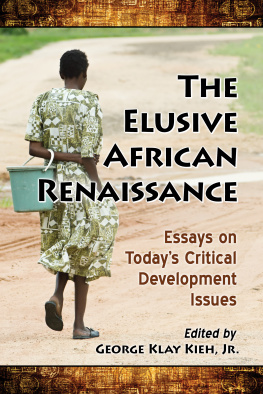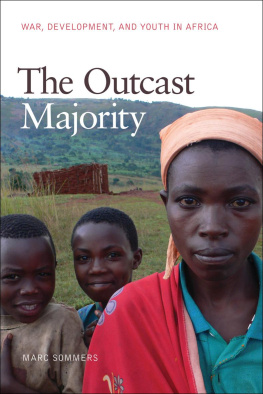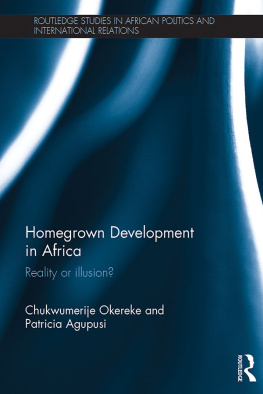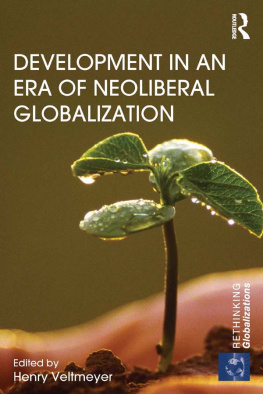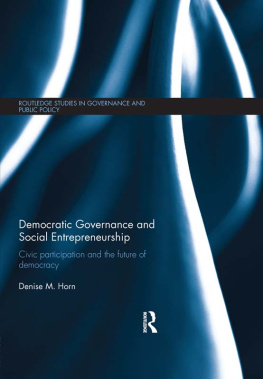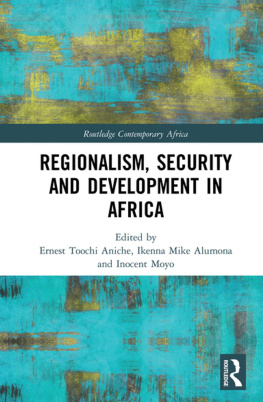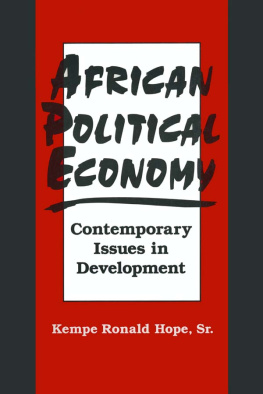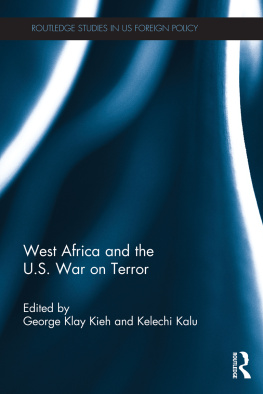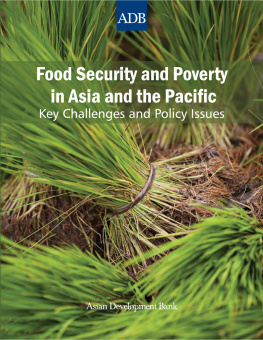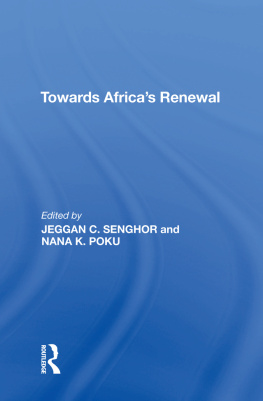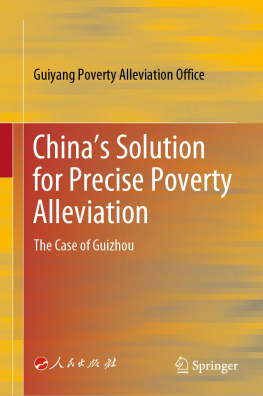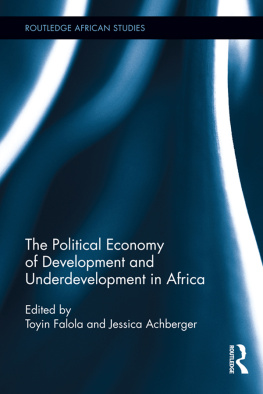
The Elusive African Renaissance
Essays on Todays Critical Development Issues
Edited by GEORGE KLAY KIEH, JR.

McFarland & Company, Inc., Publishers
Jefferson, North Carolina
LIBRARY OF CONGRESS CATALOGUING DATA ARE AVAILABLE
BRITISH LIBRARY CATALOGUING DATA ARE AVAILABLE
e-ISBN: 978-1-4766-3525-5
2018 George Klay Kieh, Jr. All rights reserved
No part of this book may be reproduced or transmitted in any form or by any means, electronic or mechanical, including photocopying or recording, or by any information storage and retrieval system, without permission in writing from the publisher.
Front cover image 2018 poco_bw/iStock
McFarland & Company, Inc., Publishers
Box 611, Jefferson, North Carolina 28640
www.mcfarlandpub.com
To the memory of our colleague David N.P. Mburu,
who contributed to the success of this volume.
Regrettably, he passed away while the volume was
being prepared. We will continue to work tirelessly
for the fulfillment of Davids dream of a democratic
and developed Africa in which its constituent
states make public investments in the material
advancement of the African peoples, including
in the critical area of education.
Acknowledgments
We would like to acknowledge the kind assistance of two journals. The Journal of Safety and Crisis Management granted permission for Emmanuel O. Oritsejafor to use his article, Silent Tsunami: The Nexus of Food Security and Rising Oil Prices in Sub-Saharan Africa, Vol. 2, No. 2, 2012, pp. 112, as the foundation for his essay The Nexus of Food Security and Bio-Fuels in Sub-Saharan Africa. Similarly, we would like to thank the Journal of Developing Societies for George Klay Kieh, Jr., to use his article The State and Political Instability in Africa, Originally published in Journal of Developing Societies, Vol. 25, No. 1. 2009 SAGE Publications. All rights reserved. Reproduced with the permission of the copyright holders and the publishers Sage Publications India Pvt. Ltd, New Delhi, as the base of his essay Political Instability and Development in Africa.
Preface
GEORGE KLAY KIEH, JR.
Africans greeted the dawn of the 21st century with tremendous optimism and expectations that the labyrinthine of development problemsjobs, education, health care, food security, clean drinking water, acceptable sanitation, democratic governance, and stability, among othersthat have bedeviled the continent and the preponderant majority of its constituent states since the post-independence era would be addressed. In this vein, the former president of South Africa, Thabo Mbeki, referred to the emergent millennium as the African Renaissance.
Interestingly, after almost two decades into the new century, the emerging evidence suggests that while some progress has been made in addressing the African continents vexatious development challenges, much work needs to be done in order to bring to fruition the African Renaissance President Mbeki envisaged. It is in this spirit that this volume was conceived. Specifically, the overarching purpose is to examine some of the continents critical development issues by analyzing the challenges and building on the progress that has been made by proffering policy-relevant proposals. Two of the overarching proposals that run through the volume are the imperative of reconstituting the neo-colonial African state and jettisoning the failed neoliberal development model and its associated permutations of structural adjustment programs and so-called debt forgiveness, and poverty reduction. Undoubtedly, the full realization of the aforementioned projects would require visionary and transformative leadership, and an engaged and activist citizenry throughout the continent.
Undoubtedly, this volume would not have been possible without the invaluable contributions of several persons and entities. First, I would like to thank the African Studies and Research Forum for commissioning the research that led to the writing of this book under its Book Series. Second, kudos to the contributors for conducting the research that culminated in the writing of their various essays, and for their willingness to revise them against the background of the comments from me and the two anonymous reviewers. Last, but not least, I would like to thank the anonymous reviewers for the feedback they provided. Certainly, it helped to enrich the quality of the essays included herein.
Introduction
Mapping the Development Landscape in Africa
GEORGE KLAY KIEH, JR.
Africa is the region of many paradoxes. For example, the continent is the richest in the world in terms of natural resourcesminerals, oil, etc.but its peoples are in the lowest rung in terms of human development. For example, mass abject poverty and human malaise are prevalent across the continent (United Nations Development Program, 2016). Also, the continent has some of the most fertile land in the world, but millions of Africans are suffering from hunger and malnourishment. Similarly, Africa has several rivers and lakes, but a significant number of Africans lack access to clean drinking water and sanitation. Kutor (2014:14) poignantly summarizes the general African development condition thusly:
[the African] Continent has remained largely underdeveloped regardless of the presence of huge natural resources (gold, cocoa, bauxite, oil, diamonds, timber) and human resource base. Several decades after the end of colonialism, most parts of Africa is [sic] still fighting with problems such as high poverty rate, corruption, lack of basic infrastructural facilities in all sectors of the economy, unemployment, high mortality rate, political instability and insecurity of lives and property.
Consequently, the continent has become the object of pity and the subject of ridicule. In the case of the former, for example, in the United States, there are numerous television commercials soliciting humanitarian assistance to Africa, ranging from food to benches and chairs for schools. Particularly, the ads that seek humanitarian assistance often show emaciated and seriously ill children in Africa as the core of their pitch to contributors. In addition, most African leaders have made begging for foreign aid the cornerstone of their states foreign policies. For example, one of the major pillars of the New Partnership for Africas Development (NEPAD) is the continents collective appeal to the Global North for more aid (Kieh, 2003; Ayittey, 2004; Taylor, 2008). Ayittey (2004:26) aptly refers to this phenomenon as Africas leaky begging bowl.
There are numerous books, articles in academic journals, articles in magazines, newspapers, blogs, and regular commentaries in various media outlets about the state of the human condition in Africa. A pervasive theme in these literatures is the depiction of the continent as the cesspool of human misery. For example, in his interesting article and book The Coming Anarchy, Robert Kaplan portrayed the African continent as the bastion of primitive life and unmitigated violence (Kaplan, 1994, 2001). Specifically, in a sweeping generalization, he argued that the continent lacks some of the most basic necessities of life, and is a caudillo of crime and violence. In his own words, The cities of West Africa at night are some of the unsafest places in the world. Streets are unlit, the police often lack gasoline for their vehicles; and armed burglars, carjackers, and muggers proliferate (Kaplan, 1994:45). Clearly, Kaplans account was pivoted on exaggeration and generalization. This is because he used a single case to generalize to the entirety of West Africa.
Next page
